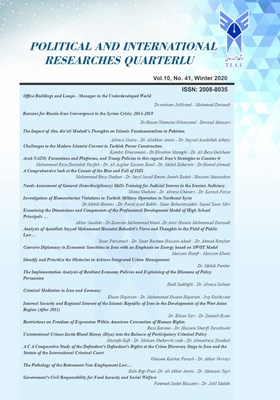-
-
List of Articles
-
Open Access Article
1 - Office Buildings and Lamps - Manager in the Underdeveloped World
-
Open Access Article
2 - Reasons for Russia-Iran Convergence in the Syrian Crisis; 2014-2019
-
Open Access Article
3 - The Impact of Abu Ala'ali Modudi's Thoughts on Islamic Fundamentalism in Pakistan
-
Open Access Article
4 - Challenges to the Modern Islamist Current in Turkish Power Construction
-
Open Access Article
5 - Arab NATO; Formations and Platforms, and Trump Policies in this regard: Iran's Strategies to Counter it
-
Open Access Article
6 - A Comprehensive look at the Causes of the Rise and Fall of ISIS
-
Open Access Article
7 - Needs Assessment of General (Interdisciplinary) Skills Training for Judicial Interns in the Iranian Judiciary
-
Open Access Article
8 - Investigation of Humanitarian Violations in Turkish Military Operation in Northeast Syria
-
Open Access Article
9 - Examining the Dimensions and Components of the Professional Development Model of High School Principals with an Emphasis on Educational Policies
-
Open Access Article
10 - Analysis of Ayatollah Seyyed Mohammad Hosseini Beheshti's Views and Thoughts in the Field of Public Law and its Impact on the Formation and Interpretation of the Constitution of the Islamic Republic of Iran
-
Open Access Article
11 - Arab NATO; Formations and Platforms, and Trump Policies in this regard: Iran's Strategies to Counter it
-
Open Access Article
12 - Identify and Prioritize the Obstacles to Achieve Integrated Urban Management
-
Open Access Article
13 - The Implementation Analysis of Resilient Economy Policies and Explaining of the Dilemma of Policy Persuasion
-
Open Access Article
14 - Criminal Mediation in Iran and Germany
-
Open Access Article
15 - Internal Security and Regional Interest of the Islamic Republic of Iran in the Developments of the West Asian Region (After 2011)
-
Open Access Article
16 - Restrictions on Freedom of Expression Within American Convention of Human Rights
-
Open Access Article
17 - Unintentional crimes cause a ransom in the Scale of participatory criminal policy
-
Open Access Article
18 - A C A Comparative Study of the Defendant's Defendant's Rights at the Crime Discovery Stage in Iran and the Statute of the International Criminal Court
-
Open Access Article
19 - The Pathology of the Retirement Non-Employment Law (Especially in the Area of Islamic City Council)
-
Open Access Article
20 - Government's Civil Responsibility for Food Security and Social Welfare
-
Open Access Article
21 - Book Review: Treasury's War: The Unleashing of a New Era of Financial Warfare
-
The rights to this website are owned by the Raimag Press Management System.
Copyright © 2021-2025







